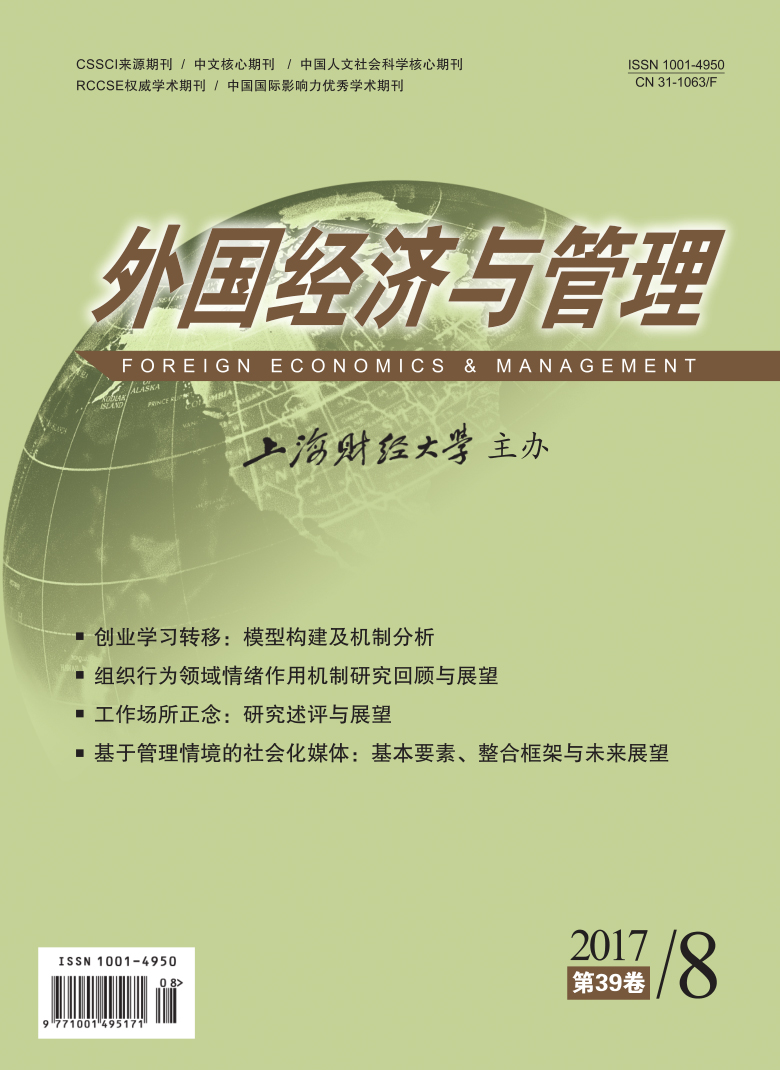面对囚徒式社会困境,主流的思路基本是延续着庇古的传统,从机制设计的视角,引入博弈规则(惩或奖)使得局中各方“讲真话”,进而提高合作绩效。但越来越多研究表明“同一博弈规则,与外生强加的相比,由成员参与制定的内生制度下合作水平更高”,即内生溢价。本文聚焦“博弈规则的产生方式”本身促进合作产生溢价现象,述评西方社会中内生溢价普遍存在及其因果机理、场景依赖特征,并围绕东方社会表现出相反的垂直溢价,即外生制度下合作绩效更高,提出因不同文化经历而习得“程序公平正当认同”的研究路径,为解释内生溢价跨文化差异提供更合理的视角,最后在归纳内生制度绩效的研究结论及其局限的基础上,展望了该领域未来研究的可能拓展路径。
内生溢价还是垂直溢价?——基于制度内生选择的跨文化比较视角
摘要
参考文献
3 (英国)霍布斯著, 黎思复, 黎廷弼译. 利维坦[M]. 北京: 商务印书馆, 1985.
4 (法国)托克维尔著, 董果良译. 论美国的民主[M]. 北京: 商务印书馆, 1988.
6 韦倩, 姜树广. 社会合作秩序何以可能: 社会科学的基本问题[J]. 经济研究, 2013,(11): 140–151. DOI:10.3969/j.issn.1005-913X.2013.11.074
8 周晔馨, 涂勤, 胡必亮. 惩罚、社会资本与条件合作——基于传统实验和人为田野实验的对比研究[J]. 经济研究, 2014,(10): 125–138. DOI:10.3969/j.issn.1002-5863.2014.10.054
9 Alesina A, Giuliano P. Culture and institutions[J]. Journal of Economic Literature, 2015, 53(4): 898–944. DOI:10.1257/jel.53.4.898
10 Bowles S, Polania-Reyes S. Economic incentives and social preferences: Substitutes or complements[J]. Journal of Economic Literature, 2012, 50(2): 368–425. DOI:10.1257/jel.50.2.368
11 Chaudhuri A. Sustaining cooperation in laboratory public goods experiments: A selective survey of the literature[J]. Experimental Economics, 2011, 14(1): 47–83. DOI:10.1007/s10683-010-9257-1
12 Cox M, Ross J M. Robustness and vulnerability of community irrigation systems: The case of the Taos valley acequias[J]. Journal of Environmental Economics and Management, 2011, 61(3): 254–266. DOI:10.1016/j.jeem.2010.10.004
13 Dal Bó P, Foster A, Putterman L. Institutions and behavior: Experimental evidence on the effects of democracy[J]. American Economic Review, 2010, 100(5): 2205–2229. DOI:10.1257/aer.100.5.2205
14 DeCaro D A, Janssen M A, Lee A. Synergistic effects of voting and enforcement on internalized motivation to cooperate in a resource dilemma[J]. Judgment and Decision Making, 2015, 10(6): 511–537.
15 De Cremer D, Tyler T R. Managing group behavior: The interplay between procedural justice, sense of self, and cooperation[J]. Advances in Experimental Social Psychology, 2005, 37: 151–218. DOI:10.1016/S0065-2601(05)37003-1
16 Ertan A, Page T, Putterman L. Who to punish? Individual decisions and majority rule in mitigating the free rider problem[J]. European Economic Review, 2009, 53(5): 495–511. DOI:10.1016/j.euroecorev.2008.09.007
17 Feld L P, Tyran J R. Tax evasion and voting: An experimental analysis[J]. Kyklos, 2002, 55(2): 197–221. DOI:10.1111/kykl.2002.55.issue-2
18 Gatiso T T, Vollan B, Nuppenau E A. Resource scarcity and democratic elections in commons dilemmas: An experiment on forest use in Ethiopia[J]. Ecological Economics, 2015, 114: 199–207. DOI:10.1016/j.ecolecon.2015.04.005
19 Giuliano P, Nunn N. The transmission of democracy: From the village to the nation-state[J]. American Economic Review, 2013, 103(3): 86–92. DOI:10.1257/aer.103.3.86
20 Grossman G, Baldassarri D. The impact of elections on cooperation: Evidence from a lab-in-the-field experiment in Uganda[J]. American Journal of Political Science, 2012, 56(4): 964–985. DOI:10.1111/ajps.2012.56.issue-4
21 Henrich J, Boyd R. Why people punish defectors: Weak conformist transmission can stabilize costly enforcement of norms in cooperative dilemmas[J]. Journal of Theoretical biology, 2001, 208(1): 79–89. DOI:10.1006/jtbi.2000.2202
22 Janssen M A, Bousquet F, Cardenas J C, et al. Field experiments on irrigation dilemmas[J]. Agricultural Systems, 2012, 109: 65–75. DOI:10.1016/j.agsy.2012.03.004
23 Janssen M A. A behavioral perspective on the governance of common resources[J]. Current Opinion in Environmental Sustainability, 2015, 12: 1–5. DOI:10.1016/j.cosust.2014.08.002
24 Kamei K. Democracy and resilient pro-social behavioral change: An experimental study[J]. Social Choice and Welfare, 2016, 47(2): 359–378. DOI:10.1007/s00355-016-0967-y
25 Kamei K, Putterman L, Tyran J R. State or nature? Endogenous formal versus informal sanctions in the voluntary provision of public goods[J]. Experimental Economics, 2015, 18(1): 38–65. DOI:10.1007/s10683-014-9405-0
26 Karakostas A, Zizzo D J. Compliance and the power of authority[J]. Journal of Economic Behavior & Organization, 2016, 124: 67–80.
27 Kocher M G, Martinsson P, Persson E, et al. Is there a hidden cost of imposing a minimum contribution level for public good contributions?[J]. Journal of Economic Psychology, 2016, 56: 74–84. DOI:10.1016/j.joep.2016.05.007
28 Markussen T, Reuben E, Tyran J R. Competition, cooperation and collective choice[J]. The Economic Journal, 2014a, 124(574): F163-F195. DOI:10.1111/ecoj.12096
29 Markussen T, Putterman L, Tyran J R. Self-organization for collective action: An experimental study of voting on sanction regimes[J]. The Review of Economic Studies, 2014b, 81(1): 301–324. DOI:10.1093/restud/rdt022
30 Sutter M, Haigner S, Kocher M G. Choosing the carrot or the stick? Endogenous institutional choice in social dilemma situations[J]. The Review of Economic Studies, 2010, 77(4): 1540–1566. DOI:10.1111/roes.2010.77.issue-4
31 Taylor M. Anarchy and cooperation[M]. New York: Wiley, 1976.
32 Torgler B. Tax morale and direct democracy[J]. European Journal of Political Economy, 2005, 21(2): 525–531. DOI:10.1016/j.ejpoleco.2004.08.002
33 Tyran J R, Feld L P. Achieving Compliance when Legal Sanctions are Non-deterrent[J]. The Scandinavian Journal of Economics, 2006, 108(1): 135–156. DOI:10.1111/sjoe.2006.108.issue-1
34 Vollan B. Socio-ecological explanations for crowding-out effects from economic field experiments in southern Africa[J]. Ecological Economics, 2008, 67(4): 560–573. DOI:10.1016/j.ecolecon.2008.01.015
35 Vollan B, Landmann A, Zhou Y X, et al. Cooperation and authoritarian values: An experimental study in China[J]. European Economic Review, 2017, 93: 90–105. DOI:10.1016/j.euroecorev.2017.01.007
36 Wang X X, Otto I M, Yu L. How physical and social factors affect village-level irrigation: An institutional analysis of water governance in northern China[J]. Agricultural Water Management, 2013, 119: 10–18. DOI:10.1016/j.agwat.2012.12.007
37 Zhao D X. The mandate of heaven and performance legitimation in historical and contemporary China[J]. American Behavioral Scientist, 2009, 53(3): 416–433. DOI:10.1177/0002764209338800
引用本文
李志云, 张文婕, 朱宪辰. 内生溢价还是垂直溢价?——基于制度内生选择的跨文化比较视角[J]. 外国经济与管理, 2017, 39(8): 115–128.
导出参考文献,格式为:






 8577
8577  8347
8347

